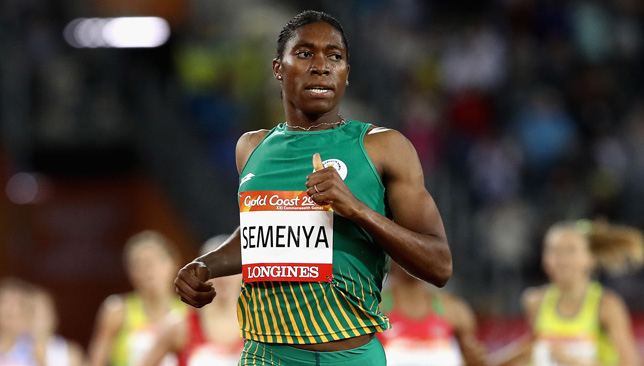
Double Olympic 800 metres champion Caster Semenya will have to take medication to lower her testosterone levels or move up to longer distances as a result of new rules announced on Thursday.
The International Association of Athletics Federations (IAAF) has introduced new eligibility regulations for female classification for athletes with Differences of Sexual Development (DSD) for events from 400m to the mile.
The regulations require any athlete who has DSD to be recognised “at law as either female or intersex” and to reduce their blood testosterone level below five nmol/L (nanomoles per litre) for a continuous period of at least six months.
This level must be maintained for as long as the athlete wishes to remain eligible for competition.
The regulations, approved by the IAAF council in March, will come into effect from November 1 and replace the previous regulations governing eligibility of females with hyperandrogenism to compete in women’s competition.
Female athletes who do not wish to lower their testosterone levels will still be eligible to compete in non-international competitions, or in the male classification.
IAAF president Sebastian Coe said: “As the International Federation for our sport we have a responsibility to ensure a level playing field for athletes. Like many other sports we choose to have two classifications for our competition – men’s events and women’s events.
“This means we need to be clear about the competition criteria for these two categories. Our evidence and data show that testosterone, either naturally produced or artificially inserted into the body, provides significant performance advantages in female athletes.
“The revised rules are not about cheating, no athlete with a DSD has cheated, they are about levelling the playing field to ensure fair and meaningful competition in the sport of athletics where success is determined by talent, dedication and hard work rather than other contributing factors.”
Sections of the report were published in the media in the UK and South Africa on Wednesday and shortly before its official release on Thursday, Semenya posted on Twitter: “I am 97% sure you don’t like me, but I’m 100% sure I don’t care.”
Although Semenya did not specifically link the post to the new regulations, it quickly received replies in support of the 27-year-old South African, who has been in the spotlight ever since it emerged she was subjected to a gender verification test at the 2009 World Championships, where she won the first of her three world titles over 800m, aged just 18.
— Caster Semenya (@caster800m) April 26, 2018
The IAAF introduced a testosterone limit in 2011, with the International Olympic Committee following suit soon after, and Semenya was beaten by Mariya Savinova at that year’s world championships and the 2012 Olympics in London, although she was later upgraded to gold medals when the Russian was caught doping.
While Semenya has never confirmed it, it is widely rumoured within the sport that she took daily pills to suppress her testosterone and stay under the IAAF limit.
That changed, however, in 2015 when the Court of Arbitration for Sport suspended the IAAF’s rules on hyperandrogenism for two years following a legal challenge by Indian sprinter Dutee Chand.
A 2017 ruling saw that suspension extended by a further six months, during which time Semenya claimed another Olympic title in Rio and a third world title in London last summer.
Earlier this month, she claimed an 800/1500 double at the Commonwealth Games in Australia but afterwards hinted that she may change events.
Semenya said: “If we still have speed in the 800m then we will still continue with the 800m. If not, then we will go further, because obviously there is 5,000m and 10,000m. When I do my long runs I feel like I can feed into distance running.”
According to Dr Stephane Bermon from the IAAF medical and science department, the treatment to reduce testosterone levels is a hormone supplement similar to the contraceptive pill.
“No athlete will be forced to undergo surgery,” Dr Bermon added. “It is the athlete’s responsibility, in close consultation with her medical team, to decide on her treatment.”